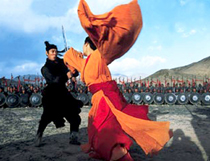The small flow of Asian films into the American mainstream leads many people to compare any film from that genre with each other – especially when the films involve the myths and history of those foreign lands. Naturally, a film like “Hero,” the latest of these foreign films from director Yimou Zhang, will be described as a combination of Kurosawa’s “Rashomon” and Ang Lee’s “Crouching Tiger, Hidden Dragon.” And while “Hero” does share traits with both of those movies, it is far more than a rehash of previous films.
The film takes place in ancient, pre-unified China, as an unnamed swordsman relates to a powerful king his tale of how he defeated the three greatest assassins in the land. Steeped in Chinese folklore and mythic symbolism, each vignette is also a beautiful demonstration of the martial arts taken to a higher peak than even “Crouching Tiger,” which is probably the last martial arts film that any pseudo-film buff saw.
The nameless warrior’s tale is soon discovered to be a lie, and the truth is revealed through more complex vignettes. All in all, the story is told numerous times with nuances changed, and the color tone and emotional response to each is highly defined. In this regard, it is more powerful than “Rashomon,” especially since it is a more visually alluring film.
If anything, “Hero” is a celebration of the highest forms of Chinese art. Each fight is linked in some way with not only the martial arts, but also another art form, such as music and calligraphy. The visual style of the film matches this theme, as each shot is taken with as much beauty as possible within the confines of the screen.
“Hero” is the most beautiful film to come out in the past decade, if not since “2001: A Space Odyssey.” In one fight sequence, an assassin and a jealous lover duel in the midst of an orchard while brilliant orange leaves flow all around them. The fighters are engulfed in nature, portrayed in lush splendor as the greatest work of art.
The film, in its celebration of Chinese culture, then surprisingly becomes a piece of nationalistic pride, in which China’s first true hero, the nameless warrior, is introduced as a great model of Chinese patriotism.
Jet Li, famous for his dubious roles in sub-par action films in America, returns to his rich roots in Chinese film in his role as the nameless warrior. While his acting was never well developed here in the States, his talents shine through in this role. He brings dignity and intensity to his character without soaking it in melodrama or jingoism. This may be because he is surprisingly very limited in the film’s action outside of fight sequences, which may be for the better through the “less is more” philosophy.
Rather, the film rests on the shoulders of two of the assassins, Broken Sword (Tony Leung Chiu Wai) and his lover Flying Snow (Maggie Cheung). These characters are the most dynamic and elicit the most emotional response from the audience, as their love goes from tragic to pathetic to heroic throughout the numerous versions of the story.
While many people are seeing “Hero” because of Quentin Tarantino’s presence, his only involvement in the film is to bring it over to America, two years after its release in China. Maybe he should stick to that task instead of recycling it into less dignified films like “Kill Bill.”
Jason Bolte can be reached at jmbolte@loyno.edu






